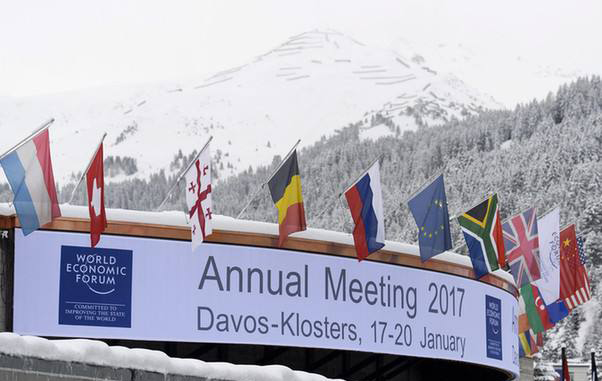Amid stagnation, China injects momentum into global economy

At the World Economic Forum in Davos on Jan. 17, 2017, Chinese President Xi Jinping reiterated China’s commitment to opening-up and its firm opposition to the trade protectionism.
Chinese President Xi Jinping declared China’s support for globalization at the World Economic Forum in Davos in January this year. The Asian Infrastructure Investment Bank (AIIB) and the New Development Bank of BRICS provided more financing to development projects in 2016.
All these phenomena show that China is increasingly assuming its responsibility by actively participating in global economic governance, said Wang Lei, director of the Centre on BRICS Countries Cooperation at Beijing Normal University.
China’s economic transformation and structural adjustment still provided much of the momentum for global economic growth against the backdrop of a weak economic recovery from the 2008 global financial crisis. China’s annual contribution rate to the world economy growth in 2016 was more than 30 percent, according to the report of the International Monetary Fund released in January, Wang said.
Wang Qin, a research fellow from the Institute of Industrial Economics at the Chinese Academy of Social Sciences, said China’s role as the engine of the world economy derives primarily from its enormous economic influence on the world market in products, technology and management.
China’s applied technologies in such areas as high-speed railways and construction engineering have reached advanced standards in the international market. At the same time, Chinese technologies are competitive in terms of cost, Wang Qin said. China exports its technology and capital through the “Belt and Road” initiative, satisfying the needs of countries along the proposed routes at low cost, he said.
Such international organizations as the IMF, the World Bank and the World Trade Organization are important parts of the global trade and financial system. However, these organizations need further reforms confronting the challenges of global economic structural changes and recovery.
Wang Lei suggested China’s ability to improve the existing economic system of governance was made possible by its increasing share and voting rights in the IMF and World Bank as well as influence in the WTO.
China cooperated with the emerging economies and developing countries to help these countries to increase their share and voting rights in the IMF and World Bank and protected their interests within the WTO, Wang Lei said.
At the same time, Wang Lei said China helped to supplement the international financial system by establishing such new institutions as the AIIB and the New Development Bank of BRICS and shared China’s experience and achievement in developing economy.
President Xi said at Davos that China will actively guide the global economy and globalization onto the right path. China showed a clear attitude of rejecting trade protectionism, proposing an open and inclusive world economic system, and defending the central position of the global multilateral trade system, Wang Lei said.
The world economy faces an uphill battle in recovery and lacks momentum as a result of the imbalance caused by globalization, said Du Debin, dean of the School of Urban and Regional Science at the East China Normal University. China has addressed this problem by strengthening domestic reforms, speeding up the development of its middle and western regions and increasing subsidies to impoverished areas. And the “Belt and Road” initiative will also strengthen China’s connection with the world economy, Du said.
Zhang Junrong is a reporter at the Chinese Social Sciences Today.

 PRINT
PRINT CLOSE
CLOSE